Related Research Articles

Maximilian Schell was a Swiss actor. He won the Academy Award for Best Actor for the 1961 American film Judgment at Nuremberg, his second acting role in Hollywood. Born in Austria, his parents were involved in the arts and he grew up surrounded by performance and literature. While he was still a child, his family fled to Switzerland in 1938 when Austria was annexed by Nazi Germany, and they settled in Zürich. After World War II ended, Schell took up acting and directing full-time. He appeared in numerous German films, often anti-war, before moving to Hollywood.
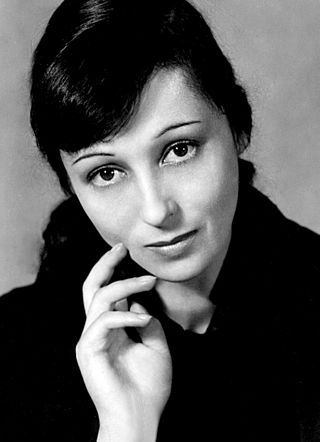
Luise Rainer was a German-born film actress. She was the first thespian to win multiple Academy Awards, and the first to win back-to-back; at the time of her death, thirteen days shy of her 105th birthday, she was the longest-lived Oscar recipient, a superlative that has not been exceeded, as of 2025.

Rosa Albach-Retty was an Austrian film and stage actress.

Senta Verhoeven is an Austrian-German actress. She received many award nominations for her acting in theatre, film, and television; her awards include three Bambi Awards, two Romys, an Adolf Grimme Award, both a Deutscher and a Bayerischer Fernsehpreis, and a Goldene Kamera.

Paula Anna Maria Wessely was an Austrian theatre and film actress. Die Wessely, as she was affectionately called by her admirers and fans, was Austria's foremost popular postwar actress.

Leontine Sagan was a theatre director and actress of Jewish descent, whose life and career took her from the Austro-Hungarian Empire to South Africa, Britain and the United States. She is, however, best known for directing a film, Mädchen in Uniform (1931), which has been celebrated for its scathing indictment of Prussian military-style schooling, as well as its sensitive portrayal of same-sex intimacy between a teacher and a student at a girls' school, in the waning years of Germany's Weimar Republic,
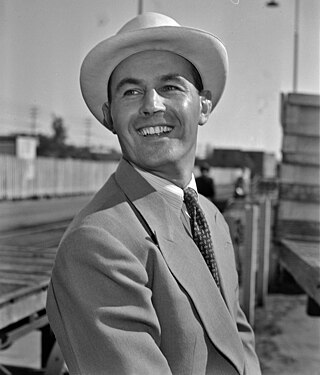
Jan Wiktor Kiepura was a Polish opera singer and actor. He enjoyed a successful international career and performed at leading concert halls around the world including La Scala, Metropolitan Opera, Royal Opera House, Opéra-Comique, La Fenice and Teatro Colón. He was the recipient of numerous national and international distinctions and honours including Poland's Order of Polonia Restituta, France's Legion of Honour and Sweden's Order of the Polar Star.

Susan Denberg is a German-Austrian model and actress. Denberg has appeared on stage and in film, notably in Frankenstein Created Woman (1967) and other roles in the 1960s.

Gusti Wolf was an Austrian stage, film, and television actress.

Marta Eggerth was a Hungarian actress and singer from "The Silver Age of Operetta". Many of the 20th century's most famous operetta composers, including Franz Lehár, Fritz Kreisler, Robert Stolz, Oscar Straus, and Paul Abraham, composed works especially for her.
Caroline Vasicek is an Austrian actress and singer.
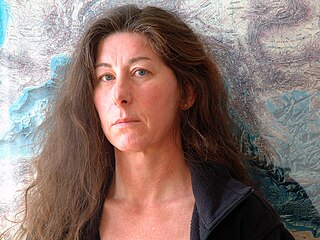
Miki Malör is an Austrian theatre creator, director and performance artist.
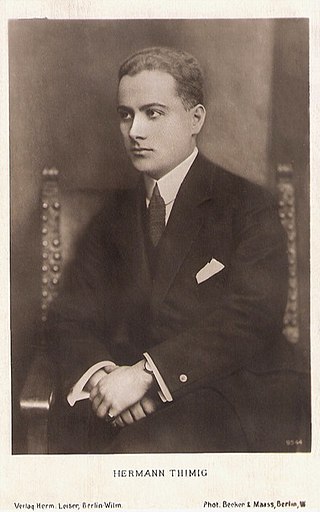
Hermann Thimig was an Austrian stage and film actor. He appeared in 102 films between 1916 and 1967.
Gretl Schörg was an Austrian operatic soprano and actress. She was particularly known for her performances in operettas. Her signature roles included Dodo in Wedding Night in Paradise, Josepha Vogelhuber in The White Horse Inn, Juliette in Der Graf von Luxemburg, Julischka in Maske in Blau, Laura in Der Bettelstudent, and Pepi in Wiener Blut. She made several operetta recordings for Telefunken, Columbia Records, and Polydor Records. She was also active as a dramatic actress on the stage and in films. In April 2004 she was awarded the Austrian Cross of Honour for Science and Art, 1st class.

Gerda Maurus was an Austrian actress.

Nusi Somogyi was a Hungarian film and stage actress.
Angelika Hauff (1922–1983) was an Austrian stage and film actress. She worked prolifically as a film actress in the immediate aftermath of the Second World War appearing in the lead roles in several successful films that included The Marriage of Figaro and Dark Eyes (1951). A versatile actor, she appeared in a variety of cinematic genres in Germany and Austria and attained international recognition in French, English and Italian films. She was a preeminent stage actress with the prestigious Vienna Burgtheatre portraying classic German language roles and being awarded the highest acting honours.
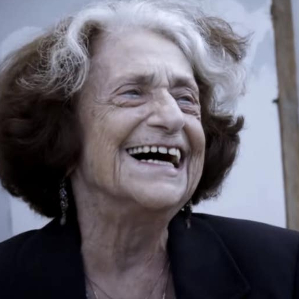
Ruth Farchi born as Ruth Zimmer was an Austrian-born Israeli TV, stage and film actress.
Birgit Doll was an Austrian actress of stage, screen and television and theatre director. She made her professional theatre debut at the age of 20 and won the Kainz Medal in 1992 for her performance of Libussa and the Nestroy Theatre Prize in 2000 for portraying Martha in Edward Albee's Wer hat Angst vor Virginia Woolf. Doll earned the Best Actress Award at the 1979 Bavarian Film Awards and the Best Actress Award at the Karlovy Vary International Film Festival in 1980 for her role as Marianne of the film Tales from the Vienna Woods.
References
- ↑ "VTP - Vienna Theatre Project - Eszter Hollosi". www.viennatheatreproject.at. Retrieved 2021-06-08.